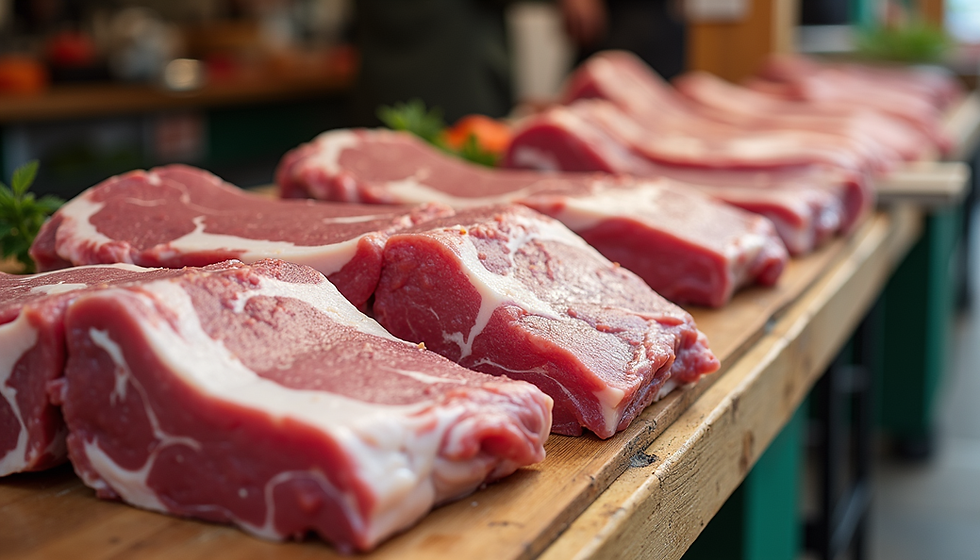The Vital Role of Supporting Local Farmers Markets for Sustainable Agriculture
- audraellis

- Sep 22, 2025
- 4 min read
Updated: Nov 11, 2025
Supporting local farmers markets is more than just a trendy choice; it is crucial for sustainable agriculture and the well-being of our communities. Farmers markets create a direct connection between consumers and producers, allowing shoppers to enjoy fresh, seasonal produce while boosting local economies. Yet, many farmers express frustration when customers show enthusiasm for their products but fail to sustain their shopping habits. In this post, we will explore why supporting local farmers markets is vital, the unique challenges farmers face, and how consumers can make a tangible difference in their community.
The Importance of Local Farmers Markets
Local farmers markets hold a key role in fostering a sustainable food system. Here’s why they matter:
Direct Sales: Farmers can sell their produce and locally raised meats directly to consumers, which means they can earn a fair price. This direct-to-consumer model reduces the carbon footprint typically associated with transporting food over long distances. Research shows that buying local can cut transportation emissions by up to 25%.
Diverse Offerings: Farmers markets often showcase a wide range of products, from seasonal fruits and vegetables to artisanal goods. For instance, in many markets, you can find heirloom tomatoes, local honey, soaps made from locally sourced pork lard and beef tallow, and homemade breads. This variety promotes biodiversity and encourages farming methods that are less harmful to the environment.
Community Connection: Farmers markets serve as gathering spots where people can share experiences and engage with their food sources. In a 2021 survey, 78% of consumers reported feeling more connected to their community through local farmers markets. This connection is essential in an age where many feel detached from the origins of their food.

The Challenges Farmers Face
Despite the numerous benefits of farmers markets, many farmers encounter several obstacles that can threaten their livelihoods:
Pricing Issues: Customers often express concerns about prices being higher than those at large grocery stores. However, it is important to understand that sustainable farming methods often come with higher production costs. For instance, organic farming can be up to 30% more expensive due to factors like organic seeds and natural pest control.
Inconsistent Support: Farmers frequently hear customers rave about their products but struggle to retain those same customers in the long term. Research shows that about 40% of farmers report losing repeat customers. This inconsistency can be frustrating, as it undermines the hard work they put into producing high-quality goods.

Building a Supportive Community
Consumers play a crucial role in supporting local farmers and the markets they rely on. Here are ways to help:
Value Understanding: Recognize the effort and resources required to produce high-quality, sustainable food. When shoppers appreciate the pricing, they create an environment that values local products.
Engage with Farmers: Take the time to talk with farmers about their stories, farming practices, and challenges. Personal connections can deepen your understanding and enhance your shopping experience.
Consistent Shopping: Aim to visit farmers markets regularly. Even committing to once a month can significantly help local farmers. Studies have shown that consistent support can lead to a 20% increase in farmers’ monthly revenue.
The Ripple Effect of Supporting Local Farmers
Choosing to shop at local farmers markets has benefits that go beyond just purchasing fresh produce:
Economic Impact: Money spent at farmers markets tends to circulate within the local economy, helping create jobs and support other local businesses. For example, every $1 spent locally is estimated to generate $3.50 for the local economy.
Healthier Choices: Buying local often promotes seasonal eating, which encourages healthier dietary choices. During peak season, fruits and vegetables are at their freshest—a time when they can provide professional nutritionists note that locally produced items can be 50% richer in nutrients compared to those sourced from afar.
Advocacy for Sustainability: By supporting local farmers, consumers are advocating for farming practices that protect the environment. Many farmers in local markets engage in crop rotation, organic farming, and reduced pesticide use—all beneficial for long-term ecological health.

Final Thoughts
Supporting local farmers markets is essential for sustainable agriculture and the overall health of our communities. While farmers face many challenges, including pricing concerns and inconsistent customer support, consumers have the power to make a positive impact. Understanding the value of local produce, engaging with farmers, and committing to shopping regularly can help create a thriving local food system.
The next time you visit a farmers market, take a moment to appreciate the hard work behind each product. Remember, your support not only benefits farmers but also helps to cultivate healthier, more sustainable communities. Together, we can ensure that local farmers markets continue to thrive for generations to come.
Why Your Support Matters
When you choose to shop at local farmers markets, you are making a statement. You are saying that you care about where your food comes from and the people who grow it. This simple act can have a profound impact on your community.
By supporting local farmers, you help preserve traditional farming methods. You also promote sustainable agriculture practices that are kinder to our planet. It’s a win-win situation.
So, the next time you see a farmers market, remember the importance of your choice. Your support can help keep these markets alive and thriving.
In conclusion, let’s make a commitment to support our local farmers. Together, we can create a more sustainable future, one farmers market at a time.
---wix---







Comments